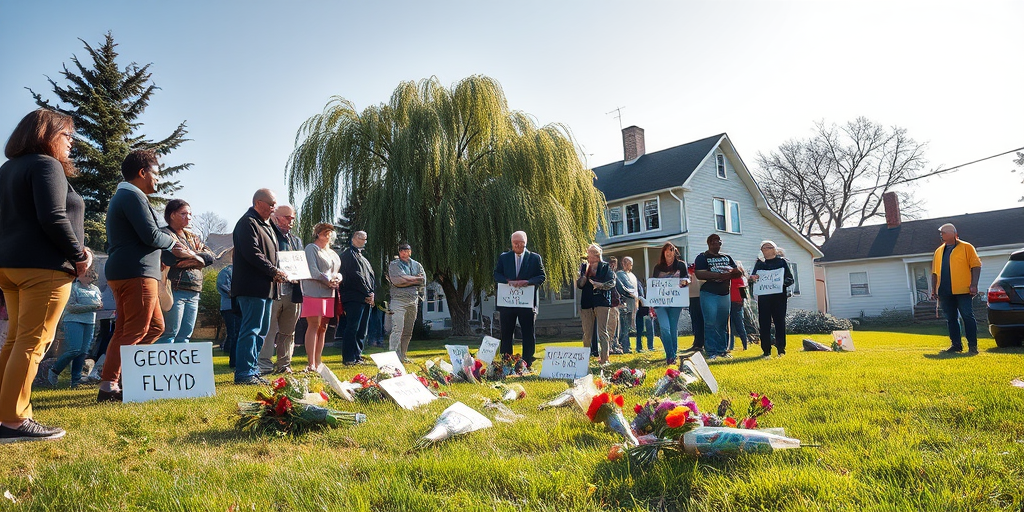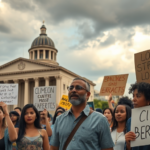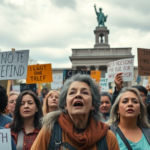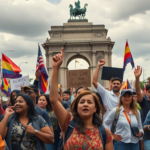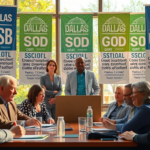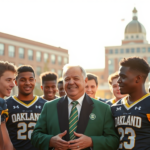5 Years After George Floyd’s Murder, the Backlash Takes Hold
The anniversary of George Floyd’s murder — a brutal act captured on video and seared into public consciousness — marks a pivotal moment in the United States’ ongoing dialogue around race and justice. Floyd’s death catalyzed the Black Lives Matter movement, propelling it into one of the largest social movements in modern American history. Yet, five years later, the groundswell of support for racial justice is experiencing a formidable backlash, marking a shift in America’s social and political tapestry.
A Changing Political Landscape
In recent years, a shift toward “white grievance politics,” as championed by figures like former President Donald Trump, has gained momentum. This brand of politics calls into question mandates perceived as overly restrictive on law enforcement. For many conservatives, this shift represents a necessary recalibration after what they view as excessive constraints on police forces. “It’s about finding a balance,” says James Connelly, a conservative commentator. “Our officers need the ability to do their jobs without undue restrictions.”
Amidst this political recalibration, notable changes have occurred. In Washington, D.C., the bold “Black Lives Matter” letters that once adorned city streets have been removed, a symbolic indication of the movement’s contraction. Nationally, police killings are on the rise, undermining initial goals set by Black Lives Matter proponents who sought to curb police violence. Additionally, the Department of Justice has pulled back on its oversight of police departments previously accused of racial bias.
Local Impact: The Community Takes Stock
For residents in communities like Minneapolis, where George Floyd’s murder took place, the aftermath carries local significance. Local activist and community leader Leona Scott reflects, “It feels like we’re moving backwards. After years of fighting for change, seeing some of our victories rolled back is frustrating.”
While the nation grapples with its next steps, local voices remain crucial. Minneapolis lawyer Jared Matthews notes the importance of sustained dialogue: “As communities, we have to keep talking about these issues, even when it feels like we’re shouting into the void.”
Continuities and Discontinuities in Social Movements
Historically, American social movements have ebbed and flowed, with periods of forward momentum often met by backlash. Following the abolition of slavery, the Reconstruction era saw a fierce pushback that included the rise of the Ku Klux Klan. The Civil Rights Movement of the 1960s faced resistance and the emergence of Nixon’s “silent majority.” Yet, the speed and extent of the current retrenchment seem particularly sharp.
The initial swell of multiracial unity in the aftermath of Floyd’s death now appears to have dissipated. Community events commemorating Floyd’s life and legacy are being held nationwide, serving both as a reminder of the work accomplished and the challenges ahead.
Connections to Previous Local Events
Locally, cities with active Black Lives Matter chapters have faced turmoil as they reassess their social and policy strategies. In areas with significant police-community tension, the rollback of reforms is threatening to dissolve tentative gains in trust between residents and law enforcement.
“The gains felt during the movement’s peak were real,” says Dr. Angela Harris, a professor of African American Studies. “But they were fragile, requiring sustained commitment from local governments.”
Potential Future Implications
Looking ahead, the future of racial justice movements in America raises pertinent questions. Could current policy shifts exacerbate racial tensions, or might they galvanize renewed activism? If the past is any indication, continued backlash might catalyze another phase of activism, urging communities to regroup and refocus their efforts.
To foster a constructive path forward, community engagement remains essential. Organizations promoting racial equity, such as local chapters of the NAACP and community advocacy groups, serve as vital resources. They provide platforms for continued education, dialogue, and advocacy, inviting residents to participate actively in shaping their communities.
Balanced Perspectives
Not everyone agrees on the best path forward. While advocates for racial justice argue that the retrenchment represents a significant step back, some law enforcement officials suggest that easing oversight allows police to more effectively protect communities. Christine Alvarez, a police union representative, proposes that, “Restoring some autonomy to our officers helps us maintain law and order, though it must be balanced with accountability.”
In communities across America, the ongoing conversation highlights the tension between ensuring public safety and safeguarding civil rights. With policies still in flux, residents observing the anniversary of George Floyd’s death understand that meaningful, systemic change requires an enduring commitment to justice and equality.
Ultimately, the impact of these changes remains a crucial subject for community interest and local impact discussions. The challenge lies in finding the common ground between divergent perspectives while remaining vigilant against the resurgence of racial inequities that the movement sought to eliminate.
For those interested in learning more or getting involved, local community centers and advocacy groups remain open for new members, providing spaces for dialogue and action. As the societal landscape continues to evolve, staying informed and engaged is key to navigating these complex issues.
For additional information, residents can contact local community resources or visit local advocacy groups that continue to carry the torch for racial equality.

